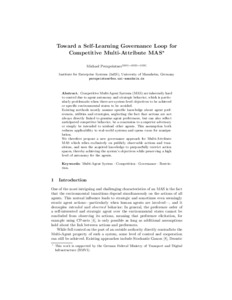|
Toward a self-learning governance loop for competitive multi-attribute MAS
Pernpeintner, Michael
![[img]](https://madoc.bib.uni-mannheim.de/59649/1.hassmallThumbnailVersion/Toward_a_Self_Learning_Governance_Loop_for_Competitive_Multi_Attribute_MAS.pdf)  Vorschau |
|
PDF
Toward_a_Self_Learning_Governance_Loop_for_Competitive_Multi_Attribute_MAS.pdf
- Angenommene Version
Download (294kB)
|
|
URL:
|
https://madoc.bib.uni-mannheim.de/59649
|
|
Weitere URL:
|
https://dl.acm.org/doi/abs/10.5555/3463952.3464179
|
|
URN:
|
urn:nbn:de:bsz:180-madoc-596492
|
|
Dokumenttyp:
|
Konferenzveröffentlichung
|
|
Erscheinungsjahr:
|
2021
|
|
Buchtitel:
|
AAMAS '21: Proceedings of the 20th International Conference on Autonomous Agents and MultiAgent Systems : Richland, SC, Virtual Event United Kingdom, May, 2021
|
|
Seitenbereich:
|
1619-1621
|
|
Veranstaltungstitel:
|
AAMAS 2021
|
|
Veranstaltungsort:
|
Online
|
|
Veranstaltungsdatum:
|
03.-07.05.2021
|
|
Herausgeber:
|
Endriss, Ulle
;
Nowé, Anne
;
Dignum, Frank
;
Lomuscio, Alessio
|
|
Ort der Veröffentlichung:
|
Richland, SC
|
|
Verlag:
|
International Foundation for Autonomous Agents and Multiagent Systems
|
|
ISBN:
|
978-1-4503-8307-3
|
|
Verwandte URLs:
|
|
|
Sprache der Veröffentlichung:
|
Englisch
|
|
Einrichtung:
|
Außerfakultäre Einrichtungen > Institut für Enterprise Systems (InES)
|
|
Fachgebiet:
|
004 Informatik
|
|
Freie Schlagwörter (Englisch):
|
Restriction , Competition , Governance, Multi-Agent System
|
|
Abstract:
|
Competitive Multi-Agent Systems (MAS) are inherently hard to control due to agent autonomy and strategic behavior, which is particularly problematic when there are system-level objectives to be achieved or specific environmental states to be avoided.Existing methods mostly assume specific knowledge about agent preferences, utilities and strategies, neglecting the fact that actions are not always directly linked to genuine agent preferences, but can also reflect anticipated competitor behavior, be a concession to a superior adversary or simply be intended to mislead other agents. This assumption both reduces applicability to real-world systems and opens room for manipulation.We therefore propose a new governance approach for Multi-Attribute MAS which relies exclusively on publicly observable actions and transitions, and uses the acquired knowledge to purposefully restrict action spaces, thereby achieving the system's objectives while preserving a high level of autonomy for the agents.
|
 | Dieser Eintrag ist Teil der Universitätsbibliographie. |
 | Das Dokument wird vom Publikationsserver der Universitätsbibliothek Mannheim bereitgestellt. |
 Suche Autoren in Suche Autoren in
Sie haben einen Fehler gefunden? Teilen Sie uns Ihren Korrekturwunsch bitte hier mit: E-Mail
Actions (login required)
 |
Eintrag anzeigen |
|
|
 ORCID: 0000-0001-6939-1028
ORCID: 0000-0001-6939-1028



 Suche Autoren in
Suche Autoren in